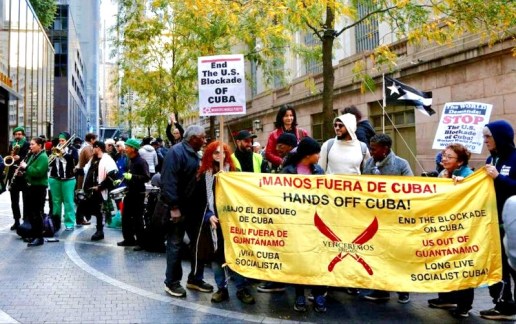End the U.S. blockade of Cuba!
October 23, 2025
Since 1992 the United Nations General Assembly (UNGA) has voted annually on the criminal U.S. blockade of socialist Cuba, which began in 1962. Each year the vote has been overwhelming for ending this blockade as a weapon wielded by U.S. imperialism. It prevents businesses in the U.S. and other countries from trading vital goods and parts with this country of now 11 million people, who chose a socialist path of development following Cuba’s historic Jan. 1, 1959, revolution.

New York City, Oct. 27, 2024. PHOTO: Brenda Ryan
Before the most recent actual vote took place on Oct. 30, 2024, Cuba’s Foreign Minister, Bruno Rodríguez Parrilla, spoke before the UNGA on the impact the blockade has had on the economy, causing tremendous hardships for the Cuban population, including recent electrical power outages due to a lack of parts to repair Cuba’s outdated electrical grid.
Rodríguez said that the Cuban economy had lost over $1.6 trillion in international trade as well as tourism since the blockade began. Despite the devastating impact of the blockade, he said the Cuban government and its people would not be deterred from continuing to build and defend socialism as their right to self-determination. He concluded his remarks with “Let Cuba live!”
Rodríguez’s comments were greeted with sustained applause by the majority of U.N. delegates, along with Cuba solidarity activists sitting in the General Assembly balcony. The symbolic vote was then taken — 187 countries voting yes to end the blockade; the U.S. and Israel voting no; and one country abstaining.
Following the Oct. 30 vote, the U.S. delegate defended the blockade using false arguments to “support” the Cuban people. In response, Cuba’s U.N. Ambassador Ernesto Soberón Guzmán presented a powerful rebuttal to the unfounded U.S. accusations.
U.S. holds UNGA hostage
On Oct. 28 and 29, 2025, U.N. representatives of many countries are expected to once again condemn the criminal blockade, calling it a violation of international law and unlawful punishment of the Cuban people. Various delegates from Caribbean, African and Latin American countries will testify to the ongoing humanitarian aid that Cuba provides for their respective developing countries, especially in the area of health care.
And once again, the U.S. will no doubt use its unilateral leverage on the U.N. Security Council (UNSC) to veto the resolution to end the blockade, similar to vetoing all measures to stop its backing of Israel’s genocide in Gaza for the past two years.
According to the Council on Foreign Affairs, the U.S. provides almost one-third of all U.N. funding. And it has not been unusual for the U.S. to withhold some of its funds if it does not agree with some of the resolutions passed by the UNGA.
The fact that the U.S. wields so much political influence within the UNSC to undermine the votes of other U.N. member countries, large and small, reflects once again the undemocratic, impotent role of the U.N.
Cuba, yes! Blockade, no!

You must be logged in to post a comment.